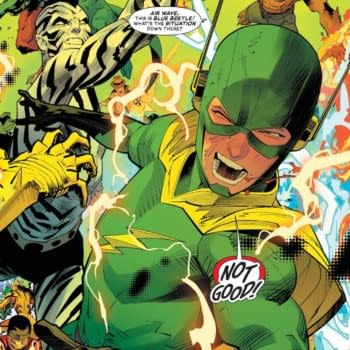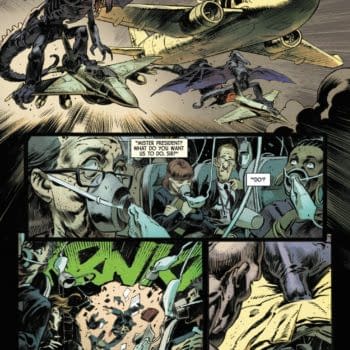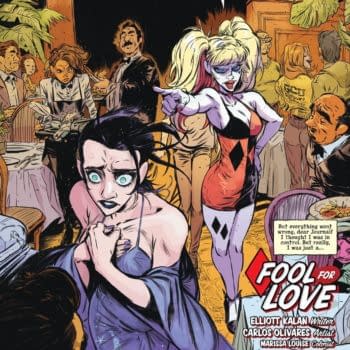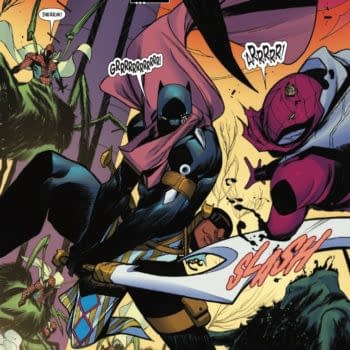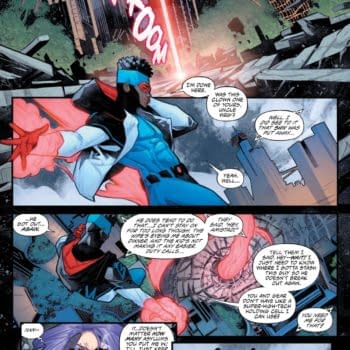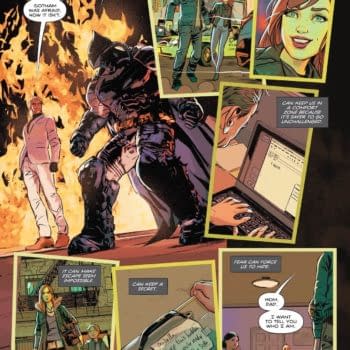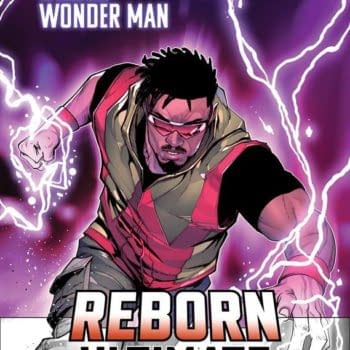Posted in: Comics | Tagged: bryan brandenburg, Comic Con International, fanx, salt lake comic con, salt lake comic convention, san diego comic con, sdcc, SLCC
SDCC v SLCC Comic-Con Trademark Battles Continues as Both Sides Prep to Go Back to War
Last December, San Diego Comic-Con ostensibly "won" its court battle with Salt Lake Comic Con over the rights to the name Comic-Con. The trial, decided by jury, ruled that San Diego Comic-Con did indeed own the valid trademark to the term, and also that Salt Lake Comic Con used it without permission. But the victory was less than decisive, with San Diego awarded only $20,000 of the $12 million they asked for. Bleeding Cool predicted two future consequences of this outcome: first, that other conventions would be open to lawsuits to SDCC, and second, that SLCC would most likely appeal the verdict.
Immediately following the victory, in a Facebook post looking to the future, SLCC co-owner Bryan Brandenburg wrote of the monetary award:
We were accused of causing $12,000,000 damage to the SDCC brand. The jury found no evidence of damage. They awarded San Diego $20,000 in damages, less than .2% of what they asked for sending a clear message that we didn't hurt the San Diego brand.
Though he did apologize for driving an SLCC-branded car around San Diego in July.
Today, The Hollywood Reporter has the details on motions filed by both sides to renew the legal battle. SLCC, as predicted, is appealing the decision. They want a new trial, arguing that the court "sharply circumscribed the evidence it allowed Defendants and counterclaimants (collectively "DFP") to present, both on infringement and in support of invalidity; and it gave improper jury instructions that undercut the limited evidence that DFP was allowed to present. The Court also allowed SDCC to present a case that was not really about the three trademark registrations that SDCC had pleaded at all but was instead directed to some catchall "comic con brand," which is a stranger to the law and not the subject of any exclusive right held by SDCC.
They also want the judge to revisit whether or not Comic-Con is a genericized trademark. "First, it was reversible error to decide naked licensing on a motion in limine," the new motion argues, referring to a term that basically means "discussed outside the presence of the jury."
"On genericness," it continues, "evidence was wrongly excluded, the jury was misinstructed, and the verdict is against the weight of the evidence."
Here's some more:
DFP had a strong naked licensing defense, but genericness "is the seminal issue" in this case. However, by a series of pretrial and in-trial rulings, the Court stripped away most of DFP's genericness evidence until all that remained were some newspaper headlines and a list of 140 or so third-party conventions with names that include some form of "comic con." The Court then undercut the evidence of competitive third-party use by instructing the jury that of the various types of evidence it might consider, third- party use is singularly impotent to prove genericness. A new trial is required to correct those and other errors that
further compromised DFP's evidence and bolstered SDCC's.
The full motion is available to read here.
Meanwhile, SDCC filed a motion of their own asking either for more money or a new trial, and though that motion is not available for you (or us) to read, THR does have a quote from SDCC's lawyer explaining it. That motion, apparently, takes particular issue with the antics of SLCC's side during the trial, especially their opening remarks.
"SDCC argues that in view of the documentary evidence presented at trial and the testimony of Defendants' witnesses, the only reasonable conclusion the jury could have reached was a finding of willfulness," attorney Callie Bjurstrom wrote. "SDCC further argues that rampant mistrial conduct by Defendants and their counsel, including impermissible and highly prejudicial statements made in opening and closing statements, as well as consistent evidentiary missteps that violated numerous prior Court orders, Defendants prevented the jury from reaching a reasonable conclusion on the issue of willfulness."
An additional motion requests an injunction preventing SLCC from referring to itself as a "comic con."
"On December 8, 2017," the filing reads, "the jury returned a unanimous verdict finding that: (1) each of the three trademarks SDCC asserted in this case is valid, and (2) each of the three named Defendants infringed each asserted trademark. For over three years, Defendants continued unabated and undeterred in their blatant infringement of SDCC's trademarks while this lawsuit proceeded to a decidedly unfavorable verdict for them. Defendants continue to infringe SDCC's trademarks to this day. An order permanently enjoining Defendants from using SDCC's trademarks or any mark confusingly similar thereto is warranted and necessary."
SDCC says they don't believe that SLCC actually plans to change their name to FanX: The Salt Lake Comic Convention, or that they could change it back later, claiming that they "have been equivocal about whether or not they will change the name of their convention and/or appeal the jury's verdict" and that SDCC "no assurance that Defendants will not revert back to using the name Salt Lake Comic Con at some point in the future." Furthermore, the motion argues, SDCC has "no assurance that Defendants will not continue to use 'Salt Lake Comic Con' in the shorthand to refer to their events," as "comic con" is popular shorthand for "comic convention."
They even took issue with Brandenburg's apology, writing, "Lastly, and despite his efforts to come across as genteel and contrite at trial, Mr. Farr's post-trial communications with SDCC after trial paint a much different story. After purporting to extend an apology and olive branch to SDCC's David Glanzer, Mr. Farr's tone quickly changed as he commended Mr. Brandenburg for the passion that drove Defendants' 'quick success,' boasting that Defendants' event now has a 'Google Trend' ranking superior to that of SDCC for the search term 'Comic Con.'"
"Mr. Farr then had the audacity to send a second email to Mr. Glanzer asking SDCC to 'release' its 'Comic-Con' trademark so that everyone could use it," the motion continues, "suggesting that a public relations nightmare would otherwise ensue for SDCC."
Additionally, SDCC is seeking $4.5 million in legal fees, claiming SLCC "never bothered to seek legal advice regarding the significance of SDCC's federal trademark registrations. Defendants looked around and saw that others were using 'comic con' with and without a hyphen and assumed they could too" and that they "preyed upon the sympathies of the jury arguing in opening statement that the citizens of Utah would suffer if SDCC prevailed in this case, that Dan Farr Productions would go out of business and that Messrs. Farr and Brandenburg would be forced into bankruptcy."
That motion can also be read here.
It looks like neither side is ready to give up the fight. The motions will be heard on May 3rd.






